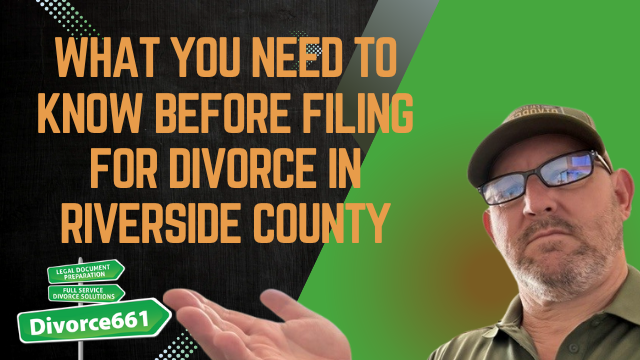What You Need to Know Before Filing for Divorce in Riverside County
I’m Tim Blankenship with Divorce661. If you’re thinking about filing for divorce in Riverside County, this guide will walk you through the local rules, common pitfalls, and the exact paperwork and steps that matter. California provides standardized forms and procedures, but each county runs its own court and has specific expectations—Riverside is no exception. Knowing the local process ahead of time can save weeks of delay, extra expense, and a lot of frustration.
Quick overview: the most important things to remember
- Residency requirement: one party must have lived in California for at least 6 months and in Riverside County for at least 3 months before filing.
- Required forms include the Petition, Summons, and the UCCJEA if children are involved.
- Riverside County accepts eFiling, but the court is strict—paperwork must be complete and accurate.
- Your spouse must be properly served and a proof of service filed to move the case forward.
- Both parties must exchange financial disclosures (mandatory even in uncontested cases).
- Missing or incomplete disclosures are one of the biggest reasons final judgments are rejected.
Residency requirement: who can file in Riverside?
Before you file, confirm residency. At least one spouse must have lived in California for 6 months and in Riverside County for at least 3 months. If you don’t meet that requirement, you’ll need to wait or file in the county where residency qualifies. This is a basic threshold the court enforces—skip this and your case may be dismissed.
Forms you’ll need to file
Filing for divorce is more than filling out a couple of forms. At minimum you’ll need:
- Petition for Dissolution (the main form that starts the case)
- Summons (gives your spouse notice of the case and temporary orders)
- UCCJEA — the Uniform Child Custody Jurisdiction and Enforcement Act form — if you have children. (Note: this is sometimes misstated as UCCCJA in casual conversation.)
Riverside County accepts electronic filing, which is convenient, but eFiling doesn’t remove the court’s expectation that every form be complete, accurate, and properly signed.
Serving your spouse: proper service matters
After filing, your spouse must be served with the Petition and Summons. Acceptable methods include:
- Service by a third party (someone over 18 who is not a party to the case)
- In cooperative situations, your spouse can sign a Notice of Acknowledgement and Receipt (often called a “waiver of service”)
Whichever method you use, you must file a proof of service with the court. Without that proof, the case cannot proceed to final judgment.
Financial disclosures: mandatory and often mishandled
Both parties are required to exchange financial disclosures. These are not optional—even in uncontested divorces—and the court enforces them strictly. Required disclosures commonly include:
- A Schedule of Assets and Debts
- An Income and Expense Declaration
“Skipping it is one of the biggest reasons the court will reject a final judgment.”
Incomplete, inaccurate, or missing disclosures are one of the primary causes of rejected final judgment packages. The court expects full transparency so judges can approve settlements and finalize judgments with confidence.
Submitting the final judgment package — common pitfalls
When your disclosures, settlement agreement, and final paperwork are complete, you submit the final judgment package to the court. This is where many people run into problems. Typical issues that cause rejection include:
- Missing or unsigned forms
- Errors in financial disclosures or settlement agreements
- Improper proof of service or missing acknowledgment forms
- Inconsistencies between the settlement agreement and the judgment forms
If anything is incomplete or incorrect, the court will reject the package. That means additional rounds of correction, re-filing, and delay—sometimes weeks or months longer than necessary.
Real example: how small errors cause big delays
We recently worked with a couple in Riverside who had agreed on everything and thought they had filed correctly. Their case was rejected twice because of errors in their financial disclosures and issues in the settlement agreement. They were frustrated, so we reviewed every form, corrected the errors, and resubmitted. Their judgment was approved within a few weeks.
That story illustrates two important points: first, even simple errors can derail an otherwise straightforward case; second, careful review and local experience make a measurable difference in timing and outcome.
Checklist: before you file in Riverside County
- Confirm residency (6 months in CA, 3 months in Riverside County).
- Complete Petition and Summons accurately.
- If you have children, complete the UCCJEA form.
- Plan how you will serve your spouse and be ready to file proof of service.
- Prepare and exchange financial disclosures: Schedule of Assets & Debts and Income & Expense Declaration.
- Review your settlement agreement for consistency with judgment forms.
- Double-check every signature, date, and required attachment before eFiling or submitting your final packet.
How we help (what Divorce661 does)
At Divorce661 we handle the entire process from start to finish for amicable couples in California. Our services include:
- Complete paperwork preparation and review
- eFiling directly with Riverside Superior Court
- Fixing rejected cases and resubmitting corrected packages
- Flat-fee, no-attorney divorce services for uncontested matters
If you want to avoid common mistakes and get your divorce finalized without unnecessary delays, visit Divorce661.com to schedule a free consultation. We’ll review your situation, confirm the local requirements, and make sure your paperwork is right the first time.
Conclusion
Filing for divorce in Riverside County follows California’s statewide rules, but the local court expects precise, complete paperwork and proper service. Don’t underestimate mandatory financial disclosures—even in uncontested cases—and always double-check everything before submitting your final judgment package. A little preparation today can prevent weeks of delay tomorrow.
For help, resources, or a free consultation, go to Divorce661.com.

